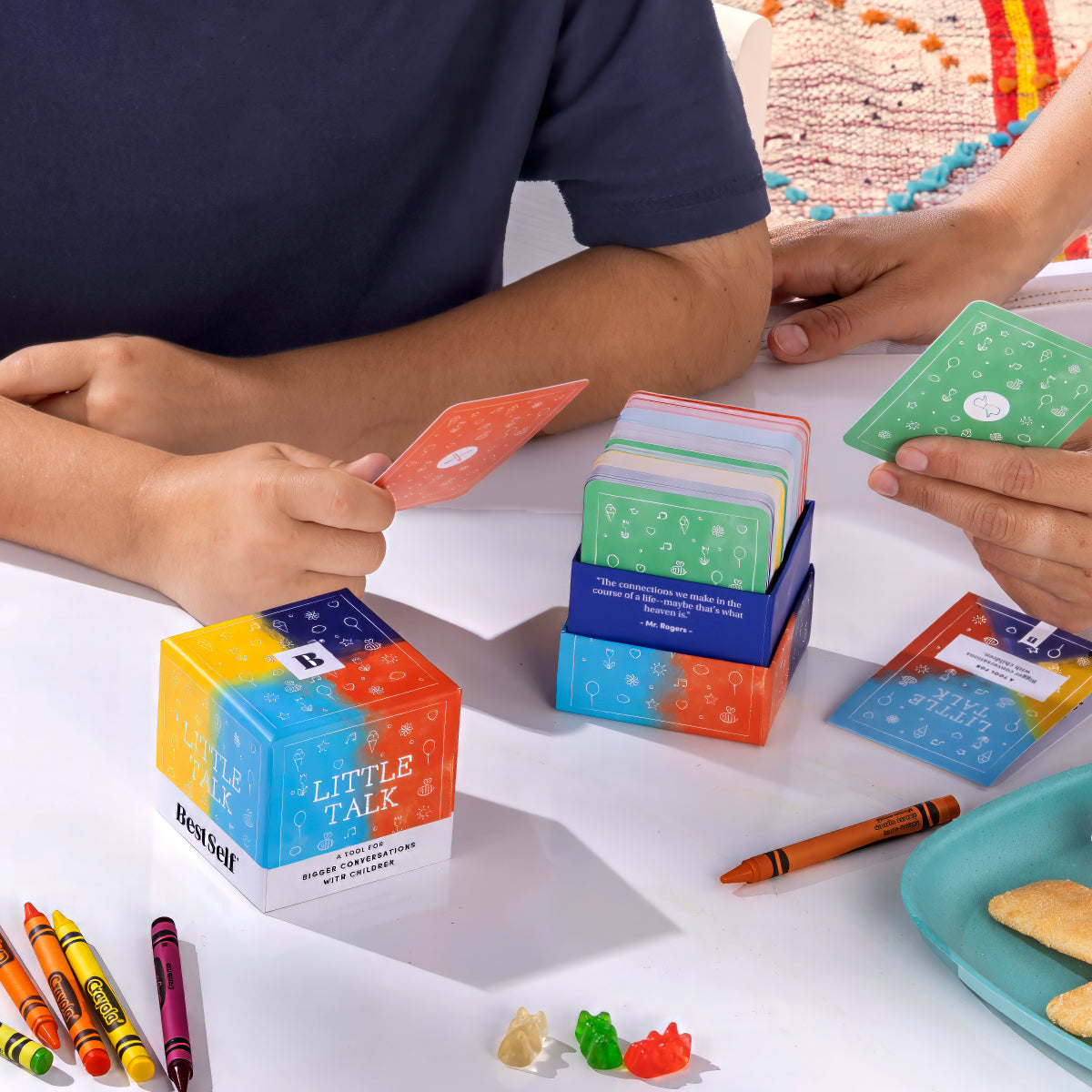As a species, we’re continually evolving as we unlock more knowledge, more potential, and more ideas. You could say we’re programmed with an evolutionary drive to ensure the next generation experiences better than the one before it.
So how can we support this process?
How can we have a positive impact on our children so they can learn from our life experiences and become their best self?
Here are seven ways that have worked for me.
I hope they inspire you too.
-
Praise
Regardless of your age, recognition and appreciation are great to receive! Being acknowledged makes us feel valued and important - and that can boost your confidence and self-esteem.
We’re all familiar with praising people for a job well done. I’m sure you’ve done it yourself countless times! For example, “You did a great job at tidying your room” or “well done on those grades for your homework assignment.”
DOING praise is super important…
But so is praising people for who they are BEING.
For example, compliments such as “you have a beautiful heart” or “I love the way that you were so kind to your brother” land a little differently. With these types of compliments, you don’t have to do anything to deserve them!
Praise for BEING teaches children they’re worthy of love for WHO THEY ARE; not just what they DO. This tactic helps children learn that it’s not their skills, talents and gifts alone that are valued and appreciated... but who they are as a person too.
[And remember, we’re human BEINGS and not human doings!]
When children feel loved and valued for their being, it instills a deep sense of self-confidence and self-love - both vital components for being your best self.
-
Inspire their creativity
“Everything you can imagine is real.” —Pablo Picasso
Everything around you [nature excluded!] started life as an idea in someone’s imagination. Creativity is the birthplace of innovation.
And children are wired with endless imagination and a head full of wild ideas! The problem is, society gradually squeezes this instinct out of them!
One of the most powerful things we can do for our children is to maintain and encourage that creative instinct.
Creativity is massively valuable to society.
Creative people solve problems and invent new stuff, as well as lighting up the world with art and other forms of artistic expression.
One of the most impactful things we can do for children is to give them space to play, explore, try things out, and mess things up! Let them write, draw, paint, dance, explore… whatever inspires their wild ideas.
Importantly, encourage the ‘messes’ as well as the successes, because creativity is - by nature - a journey of exploration. Not everything turns out the way you imagined, and that doesn’t matter. To paraphrase Edison, he didn’t fail thousands of times to create the electric light bulb. Instead, he discovered plenty of ways NOT to do it!
Imagine, if children feel safe to create without fear, who knows what they’ll invent and innovate. They could be the one to have the next paradigm-shifting idea.
Someone is going to.
And at the same time, they’ll also develop resilience as well as confidence in their ideas [and ultimately themselves].
-
Empower them
It’s easy to assume that children don’t know - because they lack the life experience of adults.
However, there have been so many times my children have blown me away with their wisdom and capability. It’s risky to underestimate them because it can knock their confidence.
Often, children do know their own mind. They do know what’s right for them - because they can feel it in their bodies. They’re in touch with their instinct, which is why it’s powerful to cultivate and strengthen self-awareness in children.
People who know themselves become influential decision-makers. They’re able to problem-solve and figure out the right actions for them. They’re less likely to be swayed by peer influence or popular opinion. Instead, they’re able to do what’s right for them.
One way we can empower children is to give them the space to find their own solutions, try things out, and learn from their experiences.
As a parent, it can be challenging to step back and watch your child ‘fail’, but as long as your child isn’t in danger, imagine the skills this approach could help them embody.
-
Don’t be perfect
I know you know this logically, but do we embody this truth?
There’s no such thing as a perfect parent.
There’s always going to be something you could have done better or differently. That’s the power of hindsight. It gives us 20/20 vision so we can learn and grow through our experiences.
I believe it’s important to know that you don’t have to be perfect in front of your children. Sure, you want to be a good role model, but that doesn’t mean getting everything right all of the time.
Because when you think about it, that’s an unrealistic expectation.
We’re human. We’re DEFINITELY going to get things wrong! We will make mistakes and have regrets - it’s part of the journey through life.
So if mess ups are inevitable, instead of trying to model perfection, what about modelling what to do if you mess up?
For example:
• How to take responsibility and ownership for the things you’ve done
• How to say sorry when you’ve hurt someone
• How to troubleshoot problems
• How to fix things and learn through the process
I believe children gain a lot from understanding that the love doesn’t go just because the behavior was undesirable.
-
Talk
It’s so important to cultivate a child’s conversational skills.
People who can talk and listen are powerful and influential - because they’re able to express themselves, ask powerful questions, and see the world through different shoes.
Conversations are also a connector.
When we talk together, we feel closer because of the shared experience that leaves us knowing each other better.
Talking is also a great way to process life and all its ups and downs. If children can talk about their beliefs, thoughts, and feelings with confidence, not only will they develop emotional intelligence, but they’ll strengthen their self-esteem too.
Finally, conversation sparks curiosity. It allows you to learn from someone else. And it enables you to stand up and be seen for who you are and what you believe.
Prompts such as the 150 inside the Little Talk Deck are a simple way to spark powerful conversations with children. Pick up your deck HERE.
-
Stretch their comfort zones
Children have infinite possibilities.
The world holds the potential for virtually anything. What could they be, have, and do as they explore their life?
The challenge is, fear is ever-present!
Fear is a survival instinct. Your brain is programmed to look for danger to keep you safe. It’s the hard-wired fight or flight response. The challenge is that humans have evolved faster than this instinctive system. Rewind thousands of years, and we needed to be able to run away from a sabre-toothed tiger or find the courage to hunt for food.
Nowadays, we have a lot of imagined fears. For example, the fear of being seen to fail stops us from even trying.
That’s why it’s powerful to inspire children to have a healthy relationship with fear where they can combat it with courage - knowing it’s OK to ‘fail’ [because you can always try again].
In turn, they’re less likely to get in their own way… and if they do, they’ll know how to get out of their comfort zone.
Empower children to cultivate a growth mindset, and they’ll learn new skills, discover more of their potential, and ultimately become their best self.
-
Be a good role model
I saved the obvious one for last!
Children learn by observing probably more than they learn from hearing.
That’s why it’s so important to walk your talk and demonstrate the things you hope your children will be. You have to be the embodiment of your advice - not just the spoken version.
With that in mind, demonstrate the power of good habits. Follow through on your promises. Be a person of integrity—practice self-love. Follow [and achieve] your dreams and live your life fully.
Be an example that inspires them of the possibilities for their life.
It could be the greatest gift you ever give to them.









Leave a comment
This site is protected by reCAPTCHA and the Google Privacy Policy and Terms of Service apply.